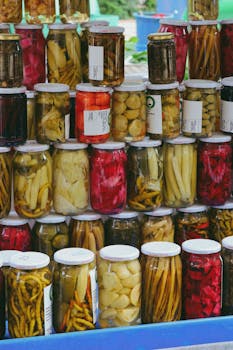Cats are curious creatures, and their noses often lead them to sniff out whatever their humans are eating. If you’ve ever wondered whether it’s safe to share pickled vegetables with your feline friend, you’re not alone. While pickled foods might seem harmless, they can pose risks to your cat’s health. Let’s dive into what makes pickled vegetables potentially unsafe for cats and how to keep your pet healthy and happy.
🥒 What Are Pickled Vegetables?
Pickling is a method of preserving food using brine, vinegar, and spices. Commonly pickled vegetables include cucumbers, carrots, beets, and onions. The process gives these foods their tangy flavor and long shelf life, but it also introduces ingredients that might not sit well with your cat’s digestive system.
Unlike humans, cats have unique dietary needs. Their bodies are designed to process animal protein, and they don’t metabolize certain ingredients the way we do. This is why it’s important to carefully consider what we feed them—even as an occasional treat.
🧂 Why Are Pickled Vegetables Risky for Cats?
While pickled vegetables aren’t toxic in the way chocolate or onions are, they contain ingredients that can be harmful to cats in large amounts. Here are the main concerns:
- High sodium content
- Vinegar and acidity
- Spices and seasonings
Let’s take a closer look at why these elements can be problematic for your feline friend.
🌊 High Sodium Content
Pickled vegetables are soaked in brine, which is a salty solution used for preservation. Cats are highly sensitive to salt, and consuming too much can lead to sodium poisoning. Symptoms of sodium poisoning include:
- Vomiting
- Diarrhea
- Excessive thirst or urination
- Lethargy
- Seizures in severe cases
Even small amounts of pickled vegetables can contain more sodium than your cat should consume in a day. This makes them a risky snack choice.
🍋 Vinegar and Acidity
The tangy flavor of pickled vegetables comes from vinegar, which is highly acidic. Cats have sensitive digestive systems, and the acidity of vinegar can cause stomach upset, including:
- Nausea
- Vomiting
- Diarrhea
While a lick of vinegar may not cause lasting harm, regular or significant exposure could irritate your cat’s stomach lining and lead to discomfort.
🌶️ Spices and Seasonings
Many pickled vegetables are seasoned with garlic, onions, dill, or other spices. Garlic and onions, in particular, are highly toxic to cats. These ingredients can damage your cat’s red blood cells, leading to anemia. Signs of onion or garlic toxicity include:
- Weakness
- Pale gums
- Rapid breathing
- Loss of appetite
Even if the pickles don’t contain garlic or onions, other spices may still irritate your cat’s stomach or cause an allergic reaction.
🐾 What If My Cat Eats Pickled Vegetables?
If your cat sneaks a small piece of pickled vegetable, don’t panic. Monitor them closely for any signs of discomfort or illness, such as vomiting or lethargy. In most cases, a small amount won’t cause serious harm, but it’s always better to be cautious.
If your cat consumes a larger quantity, especially if the pickles contain garlic, onions, or other harmful spices, contact your veterinarian immediately. Be prepared to share details about the ingredients and how much your cat ate.
🥗 Healthy Alternatives to Pickled Vegetables
If your cat seems interested in vegetables, there are safer options you can offer as a treat. Cats don’t need vegetables in their diet, but some enjoy the taste and texture. Safe vegetables for cats include:
- Cooked carrots
- Steamed broccoli
- Plain cucumber slices
- Cooked green beans
Always serve vegetables plain, without added salt, spices, or oils. Cut them into small, manageable pieces to prevent choking.
😺 Tips for Keeping Your Cat Safe
To ensure your cat stays healthy and avoids risky foods, follow these tips:
- Keep pickled vegetables and other human snacks out of reach
- Stick to a high-quality, balanced cat food diet
- Offer treats specifically made for cats
- Consult your vet before introducing new foods
By taking these precautions, you can help your cat avoid accidental exposure to harmful ingredients.
FAQs
Can cats eat pickles?
Pickles are not recommended for cats due to their high sodium content and potential harmful seasonings like garlic and onions.
Are cucumbers safe for cats?
Yes, plain cucumbers are safe for cats in small amounts. Avoid pickled cucumbers, as they contain vinegar and salt.
What should I do if my cat eats pickled vegetables?
Monitor your cat for symptoms like vomiting, diarrhea, or lethargy. Contact your vet if they ate a large amount or if the pickles contained toxic ingredients like garlic or onions.
Why do cats like pickles?
Some cats are curious about the smell or texture of pickles, but this doesn’t mean they are safe or healthy for them to eat.
What are the safest treats for cats?
Stick to vet-approved cat treats or plain, cooked vegetables like carrots or green beans. Avoid human foods with salt, spices, or seasonings.
References
Book a $49 online vet consultation at https://www.dialavet.com for fast, expert advice.








